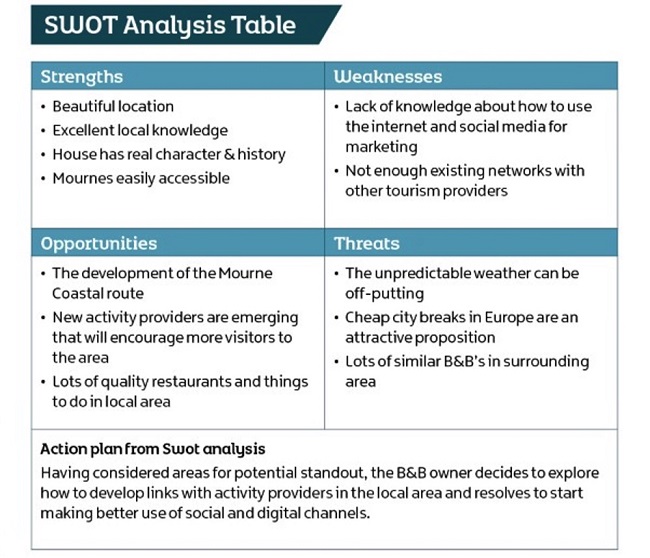5. Target markets GB & international markets
Contents
- Getting started
- 1. Know the basics - know your business
- 2. Market research
- 3. Routes to market
- 4. Target markets - closer to home (NI & ROI markets)
- 5. Target markets GB & international markets
- 6. Market research
- 7. Pricing for Profitability
- 8. Marketing Your Product
- 9. Business planning for SMEs
- 10. Working Safely in a Covid-19 Environment
- 11. Generating feedback and measuring success
Contents
- Getting started
- 1. Know the basics - know your business
- 2. Market research
- 3. Routes to market
- 4. Target markets - closer to home (NI & ROI markets)
- 5. Target markets GB & international markets
- 6. Market research
- 7. Pricing for Profitability
- 8. Marketing Your Product
- 9. Business planning for SMEs
- 10. Working Safely in a Covid-19 Environment
- 11. Generating feedback and measuring success
5. Target markets GB & international markets
The GB Market is vitally important for tourism businesses. In 2018, the island of Ireland welcomed 4.7 million visitors from Great Britain (42% of the total number of oversea visitors) and delivered €1.4 billion (around 24% of all overseas tourism revenue) to the economies of the island.
Its contribution to the regional tourism economy and to season extension objectives is also significant, with 45% of British visitors arriving between October and March.
Around 1.4 million of these (around 29%) visited NI, the majority of these sis so as part of an island of Ireland trip. British holidaymakers spend an average of 4.3 nights on the island of Ireland. Those who stayed in Northern Ireland, spend an average of 3.3 nights there. The average spend was £287
Late 2019, an industry led Working Group, supported by Tourism Ireland, Failte Ireland and Tourism Ireland, prepared a Strategy for Achieving Tourism Growth from Great Britain to the island of Ireland 2019 – 2025 and associated action planning toolkit.
This document is currently being revised and updated.
International
As we look to the return of the international markets, it is vital that you are aware of the key international markets and their propensity to visit NI and purchase your tourism product.
Tourism Ireland has the remit to promote Northern Ireland in 21 international markets across the world and works with the travel trade, online operators, media, air and sea carriers overseas to encourage consumers to 'Fill Your Heart with Ireland'.
Tourism Ireland has developed a detailed and in-depth understanding of the key markets and the best-prospects consumers within them. In the link below, you will find details of market performance, insights into market trends and consumer behaviour, examples of Tourism Ireland’s marketing activity in key markets, information on how to become involved with us in marketing your own product or service overseas, and contact details for further information.
Describe your tourism product:
Can you succinctly describe your tourism product in about 100 words. Think of that all-important 30 second elevator pitch in front of that important buyer.
Define your unique selling proposition
Before you can successfully reach your customers, you need to identify what makes your product different or unique. Why should your customers choose your offering over your competitors? In other words, what is your unique selling proposition (USP)?
Pinpointing your USP often requires some soul searching and creativity. You must think like your customers think. Who are they? Why do they choose you? What more could you offer them? Who else is doing what you do and how could you be more unique?
Develop a SWOT analysis
Think about the strengths and weaknesses of your business’s key competitors to establish where there is room for innovation or growth. What do you do better than your competitors? What do they do better than you? What are the opportunities for innovation and growth?
Put yourself in your customer’s shoes. Listen more to your customers. What do they love about what you offer, why do they choose you? Ask your customers what they would love to do that you don’t already offer? Step back from your business and carefully scrutinise what your customers really want. What would make them return again and again to your business and ignore your competition? The answer might be quality, convenience, reliability or customer service. Remember, price is rarely the only reason people buy.
Remember to consider the opportunities that lie at your doorstep. What can you utilise in your surrounding area to add depth to your product offering? Does your business share a story with an iconic attraction? Is it located in an area of natural beauty? Is there an annual music event that you could tie in with?
Example of SWOT Analysis for a B&B

Questions to ask yourself:
To analyse your business, it is helpful to start with the following questions:
- Which of my products / services are performing best?
- What is my average spend per customer?
- Which markets / segments are generating most revenue for my business?
- What proportion of my customer base is repeat business?
- During which times of the year does my business perform best / worst?